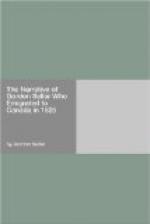Next morning as the sun was rising over the lake, the master overheard a man in the barroom asking for him, and hurried from the table. He was tall and gaunt, with a set mouth that spoke of decision of character. At the door were two saddled horses and in a few minutes they were trotting up Yonge street. When they had to slow down, on account of the road becoming full of yawning holes, Jabez had much to say about backwoods farming. He had not the personal experience of a settler, but had seen much of backwoods life and had known scores who had tried it. ’Not one in five succeeds,’ he said, ’some fail from not having money to feed their families until enough land is under crop to maintain them, others from going on stony or sandy lots that yield only poor crops, and not a few from going where it is marshy and fever-and-ague prevail. Many go into the backwoods who have not the muscle for its hard work or who will not be content to live on pork and potatoes, until they can get better, yet even they might do had they perseverance and self-denial. The Scotch and the North of Ireland people, accustomed to hard work and spare living, seldom fail.’ They were riding past much land in bush, generally without a strip of clearing. Jabez remarked the curse of Canada was giving land to people who would not go to live upon it, who had no intention of clearing it, but held it to sell. A deal of that land you see was given as grants to old soldiers. A colonel could claim 1200 acres, a major 800, a captain 600 acres, and a private 100 acres. Not one in twenty who drew their lots meant to live on them, and of the few who tried most of them failed and left. Speculators had their agents round taverns and stores ready to buy soldiers’ tickets, and got transfers for a few dollars, sometimes for a keg of whiskey or a hundredweight of pork. If you want to kill a country, deal out its land as grants to old soldiers. It does the soldiers no good and keeps back settlement, for the grants they got are left by speculators unimproved, to the hurt of the genuine settlers, who want roads opened, fences put up, and ditches dug. You will find out this yourself when you begin to clear a lot. This giving away land to soldiers is well meant, but soldiers wont go on it and it is just a way to make speculators rich. No man should get an acre from the government unless he binds himself to live on the land and clear it. On the master saying he was told much land was got by politicians, Jabez grew warm in denouncing them. Whatever party was in office, used the land as a means of bribery. They bought the support of members by grants of land and, when an election came round, got the settlers to vote as they wished under threats of making them act up to the letter of their settlement duties or offering back-dues and clear titles in return for their support. No candidate opposed to the government can be elected for a backwoods county. With such talk Jabez relieved their journey until they came to a side-road,




